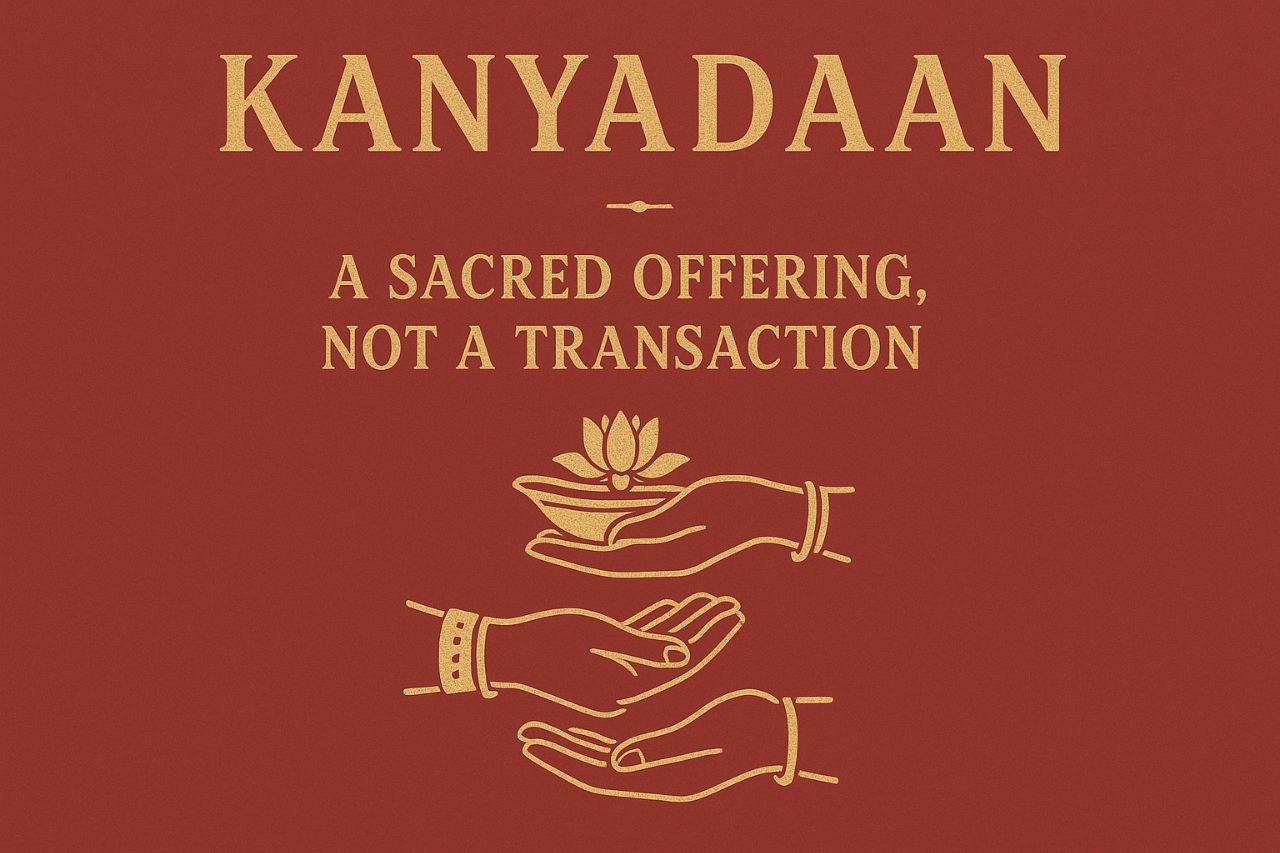Kanyadaan: A Sacred Offering, Not a Transaction

In recent times, the sacred term Kanyadaan has been unfairly misinterpreted, often mocked or attacked as a sign of patriarchy by those who neither understand the spiritual depth of Sanatan Dharma nor the linguistic roots of Sanskrit. It is essential to clarify what Kanyadaan truly signifies, far from the distorted perceptions peddled by ideological critics.
Understanding the Word: 'Kanyadaan' in Sanskrit
The word Kanyadaan is derived from Vedic Sanskrit and follows its grammatical structures. It can be understood in two ways:
Possessive Case (Genitive): Daan of Kanya, the father relinquishes his parental rights, acknowledging that the daughter has now come of age and is ready for the next sacred phase of life.
Dative Case: Daan for Kanya, the father dedicates himself and his resources to support his daughter in her journey into a new life, ensuring her well-being and happiness.
Both meanings highlight a sense of responsibility, reverence, and selflessness, not ownership.
Not a Donation, But a Sacred Offering
While the word “daan” translates loosely as "donation," it does not imply that the daughter is a possession or object to be given away. Rather, it represents:
⇛ The end of the father’s worldly responsibility over his child.
⇛ The start of a new life partnership, supported by society and solemnized through a yajna.
It’s worth noting that the English word “donation” itself is etymologically derived from the Sanskrit daan, but its modern usage lacks the spiritual sanctity of the original term.
Vivāha is a Yajna, Not a Contract or License
In Sanatan Dharma, Vivāha (marriage) is not merely a social contract. It is one of the 16 major samskaras (sacraments), a Yajna or sacred offering. Yajna means a selfless act done for a greater purpose.
The spirit of yajna is captured in the phrase "Idam Na Mama", this is not for me.
In this light:
Vivāha is not about sex or reproduction.
It is a spiritual commitment to raise a worthy next generation, to uphold Dharma, and to walk together toward a higher purpose.
Consent is Central to Vivāha
The Vedas are clear, no Vivāha can be sanctified without the willing consent of both the man and the woman. Any union without mutual choice and commitment is termed Asuric (demonic), not Dharmic.
Protection ≠ Control
Another misunderstood aspect is the Vedic guidance that:
⇛ A father protects his daughter in childhood,
⇛ A husband protects her in her youth,
⇛ A son protects her in old age.
This is not about control, it is about the duty of care and protection in a civilized society. True masculinity in Sanatan Dharma involves valor, responsibility, and self-sacrifice, as seen historically when men gave their lives to protect the honor of women from invaders.
Transfer of Responsibility, Not Ownership
Kanyadaan is the transfer of responsibility, not ownership. When a father offers his daughter’s hand in marriage:
He acknowledges her growth and maturity.
He entrusts her care to a worthy partner.
He commits to continue supporting her emotionally and spiritually.
This is done not as a loss, but as an act of deep love and spiritual surrender, an offering made for a noble cause.
Why There’s No ‘Purushdaan’
Critics sometimes ask why there's no concept of Purushdaan. The answer lies in natural roles, not superiority:
Men are typically physically stronger, suited to protection and provision.
Women are emotionally deeper, creators of culture, nurturers of life.
Sanatan Dharma doesn't deny these natural differences, it celebrates and sanctifies them.
Modern distortions, like the infamous ad suggesting Groom Daan, stem not from progress but from a lack of understanding of Dharmic ethos and often a deliberate attempt to deride ancient wisdom.
Kanyadaan Is a Sacred and Noble Concept
Kanyadaan is not just a ritual, it is a profound spiritual act. It acknowledges a daughter’s journey from one sacred phase of life to another, supported by love, consent, and responsibility.
As long as human beings retain their natural instincts, physical strength in men, emotional intelligence in women, this beautiful balance, when guided by Dharma, will continue to uplift society.
“When love becomes sacrifice, and sacrifice becomes sacred, society blossoms. That is the essence of Kanyadaan.” ~ Adarsh Singh
Mon Aug 4, 2025
